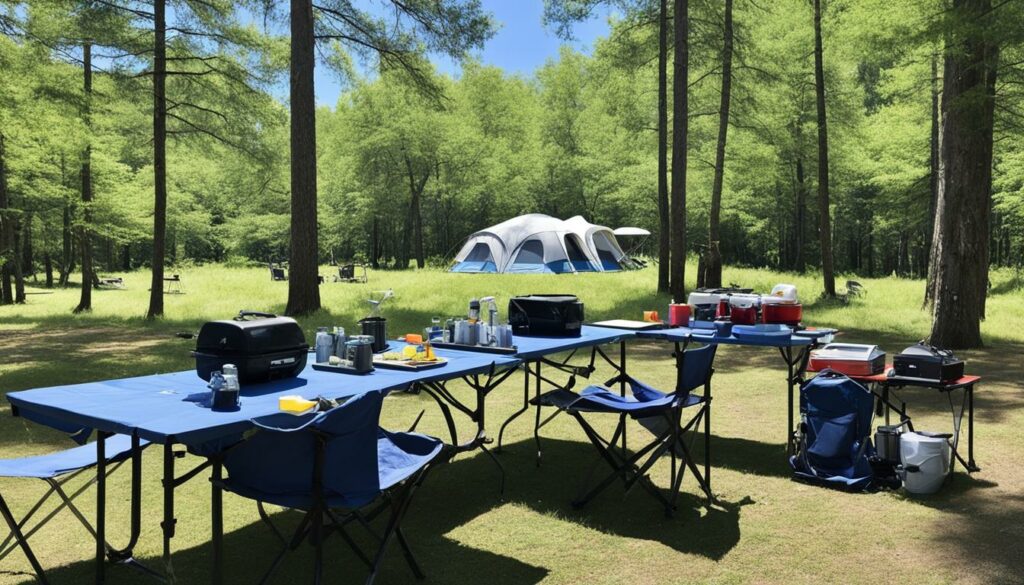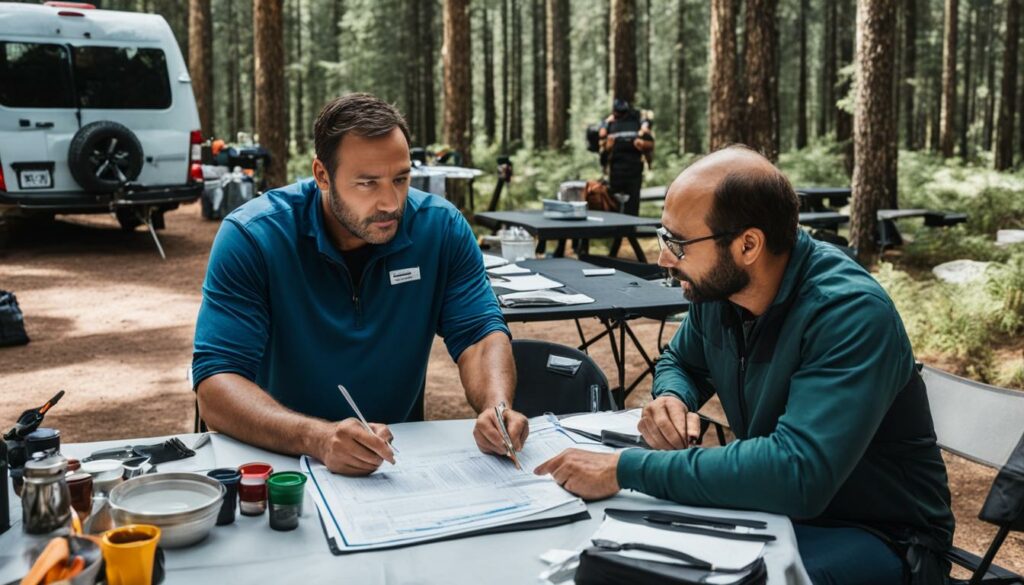In the highly competitive outdoor hospitality industry, vendor contracts play an essential role in the success of campgrounds and resorts. Outdoor Hospitality Vendor Contracts are often complex and can involve a multitude of clauses and terms that can impact the operational and financial aspects of the business.
It is important for campground and resort managers to have a thorough understanding of these contracts and effectively manage them to ensure the best outcomes for their business. In this article, we will explore the basics of campground vendor contracts and outdoor resort vendor agreements, best practices for selecting and managing vendor partnerships, key considerations for drafting and negotiating contracts, and effective strategies for ensuring compliance and managing disputes.
Read on to learn how to navigate the complexities of vendor contracts in the outdoor hospitality industry.
Key Takeaways:
- Vendor contracts are crucial for the success of campgrounds and resorts in the outdoor hospitality industry.
- Understanding the basics of outdoor hospitality vendor contracts and implementing effective contract management practices is important.
- Properly selecting and negotiating favorable terms with vendors is critical to creating successful partnerships.
- Clear expectations and effective monitoring and evaluation processes are essential for ensuring compliance and performance in vendor contracts.
- Regularly reviewing and optimizing vendor contracts is important to adapt to changing business needs and market conditions.
Understanding the Basics of Outdoor Hospitality Vendor Contracts

Outdoor hospitality vendor contracts are critical to the success of campgrounds and resorts. These contracts outline the terms and conditions of the agreement between the vendor and the campground or resort, including obligations, payment terms, and dispute resolution processes. In this section, we explore the key components of these contracts and the critical role they play in outdoor hospitality management.
One of the most critical aspects of these contracts is the campground supplier contracts and vendor contract templates that both parties use. These templates should be standardized and include all essential contract clauses to ensure that the agreement is clear, concise, and legally binding.
Contract management in outdoor hospitality is equally crucial. To ensure that the vendor delivers quality goods and services according to the contract terms, effective management practices must be implemented. This process involves monitoring the vendor’s performance, ensuring compliance with contract terms, and resolving any conflicts that may arise.
Vendor Contract Templates
The use of standardized vendor contract templates is essential to ensure that contracts are comprehensive and legally binding. These templates should contain all necessary provisions, including the scope of work, payment terms, warranties, and dispute resolution processes.
Having a standardized template also helps to streamline the contract negotiation process, as both parties know what to expect from the agreement. With a template in place, vendors can also create proposals that align with the campground or resort’s expectations, reducing the chances of disputes or confusion down the line.
Contract Management in Outdoor Hospitality
Effective contract management in outdoor hospitality is essential to ensure that vendors deliver quality goods and services and meet their contractual obligations. Practices such as contract tracking and monitoring, performance evaluation, and collaboration can help ensure that the vendor relationship stays on track and meets its goals.
To manage these contracts efficiently, campgrounds and resorts should establish a set of best practices, including standardized processes, clear communication channels, and accountability mechanisms for all parties involved.
Selecting Vendor Partnerships for Outdoor Hospitality

Choosing the right vendors is crucial for the success of any outdoor hospitality operation. To ensure the best outcomes, it is imperative to engage in a rigorous process of evaluation and selection. Here are some of the best practices for selecting and establishing vendor partnerships in the outdoor hospitality industry:
- Define your needs and goals: Start by understanding your needs and goals for each vendor category and identifying specific requirements to meet them.
- Do your research: Research potential vendors thoroughly, taking into account their experience, reputation, and compatibility with your operation.
- Request proposals: Ask potential vendors to submit proposals that outline their services, pricing, and any other relevant details.
- Negotiate contracts: Negotiate contracts that clearly define the scope of services, responsibilities, performance expectations, and terms of payment.
When evaluating vendors, it is important to consider factors beyond price, including reliability, responsiveness, quality of service, and sustainability. By taking a strategic approach to vendor partnerships and adhering to best practices, outdoor hospitality operations can establish successful and mutually beneficial relationships that drive long-term success and profitability.
Key Considerations for Outdoor Hospitality Vendor Contracts

Effective contract negotiation and management are critical to maximizing the success of vendor partnerships in the outdoor hospitality industry. As such, there are several key considerations that campground and resort owners should keep in mind when negotiating supplier partnership agreements.
One important clause to include in vendor contracts is a termination clause. This allows either party to terminate the contract in the event of a breach or noncompliance with the terms of the agreement. Additionally, contracts should include clear performance metrics and expectations to ensure that vendors are meeting their obligations.
“It’s important to be very clear about what you expect from your vendors upfront. That way, there are no surprises down the line and everyone is on the same page,” says Sarah Johnson, owner of Happy Camper Campground.
Another important consideration is intellectual property rights. Vendors should not be granted the right to use the campground or resort’s name or logo without prior consent. Additionally, contracts should include provisions for protecting sensitive information and trade secrets.
| Considerations for Outdoor Hospitality Vendor Contracts | Importance |
|---|---|
| Termination clause | Allows for contract termination in case of breach or noncompliance |
| Performance metrics and expectations | Ensures vendor compliance with contract terms |
| Intellectual property rights | Protects property and trade secrets |
Finally, it is important to consider liability and indemnification in vendor contracts. Vendors should be required to indemnify the campground or resort against any damages or losses incurred as a result of their products or services. This protects the interests of the campground or resort in the event of a lawsuit or other legal action.
By keeping these key considerations in mind during the contract negotiation and drafting process, campground and resort owners can better protect their interests and maximize the value of their vendor partnerships in the outdoor hospitality industry.
Ensuring Compliance and Performance in Vendor Contracts

When it comes to vendor contracts in outdoor hospitality, it’s critical to ensure compliance and performance from your suppliers. One of the most effective ways to achieve this is by setting clear expectations from the outset. With a well-defined supplier partnership agreement, both parties will have a shared understanding of the terms and conditions, along with the respective obligations and responsibilities.
In addition to setting expectations, monitoring and evaluating performance is another crucial aspect of ensuring compliance from your vendors. Regular check-ins, performance reviews, and reporting can quickly identify any issues and help resolve them before they become major barriers to success. By keeping track of metrics such as on-time delivery, quality of goods and services, and communication responsiveness, you can better manage your vendors and improve your bottom line.
Best practices for contract management in outdoor hospitality
Contract management is a key part of ensuring compliance and performance from vendor contracts. In outdoor hospitality, this involves tracking and monitoring contract terms, ensuring adherence to compliance requirements, and proactively managing risk. Effective contract management practices include:
- Using standardized contract templates to streamline the process
- Assigning clear roles and responsibilities for contract management tasks
- Conducting regular contract audits and reviews
- Implementing vendor performance metrics to measure compliance and quality
- Establishing protocols for dispute resolution and conflict management
By putting these best practices into action, you can optimize your vendor contracts, minimize risk, and ensure the continued success of your outdoor hospitality business.
Managing Vendor Relationships in the Outdoor Hospitality Industry
Vendor relationships are essential to the success of any outdoor hospitality operation. Effective management of these relationships is critical to ensuring positive outcomes for both the campground or resort and the vendor. To this end, the best practices for managing vendor relationships in the outdoor industry include:
- Communication and Collaboration: Open communication and collaboration are essential to building and maintaining successful vendor relationships. Regular meetings and consultations facilitate mutual understanding of expectations, and help address any concerns or issues that may arise.
- Ongoing Evaluation: Continual evaluation of vendor performance is a must for maintaining quality standards in outdoor hospitality. Regular assessments can help identify areas for improvement and address any negative trends in vendor performance.
- Flexible Contracting Services: The best vendor relationships require flexibility in contracting services. Outdoor hospitality vendors must be willing to adapt to changing needs in the industry and respond to evolving customer demands.
Integrating these practices into vendor relationships can foster a culture of trust and collaboration that benefits both parties. By implementing these strategies, campground and resort owners can achieve optimal outcomes from their vendor partnerships in the outdoor hospitality industry.
Addressing Contract Disputes and Conflict Resolution
In the outdoor hospitality industry, conflicts and disputes may arise in vendor contracts, which can affect the financial success of campgrounds and resorts. To prevent these issues from escalating, it’s essential to address and resolve them promptly. One of the most effective ways to prevent conflicts is to clarify expectations and goals from the outset of negotiations, particularly regarding contract negotiation for outdoor hospitality vendors and supplier partnership agreements.
If issues do arise, negotiation should be the first step in the resolution process. It’s essential to explore options to mutually benefit both parties while maintaining a positive long-term relationship. Alternative dispute resolution mechanisms, such as mediation, can be useful in settling disputes without resorting to litigation. However, if the parties are unable to reach a mutually satisfactory agreement, resorting to legal proceedings may become necessary.
Case Study:
An example of a dispute in the outdoor hospitality industry involved a campground vendor contracted to supply firewood. The agreement included clauses that required the supplier to provide clean, dry, and seasoned wood. Still, the vendor repeatedly supplied poor-quality wood that failed to meet the campground’s standards. The issue was eventually resolved through active communication and negotiation, with the supplier agreeing to adjust their process to meet the standards outlined in the contract.
“Effective communication is key in preventing and resolving conflicts in outdoor hospitality vendor contracts. It’s crucial to establish clear expectations and goals and communicate openly and honestly throughout the contracting process.”
Continual Improvement and Contract Optimization
In the outdoor hospitality industry, vendor contracts are a crucial element of any successful campground or resort operation. As such, it is essential to prioritize the continual improvement and optimization of these contracts to ensure optimal performance and profitability.
Regularly reviewing and updating vendor contracts is key to adapting to changing market conditions, identifying opportunities for improvement, and mitigating risks. By conducting routine contract audits and evaluating supplier performance, businesses can identify areas for optimization and take necessary action.
To optimize vendor contracts, businesses should focus on developing best practices for contract management, including the use of standardized templates, clear communication, and effective negotiation tactics. Leveraging technology and software solutions can also enhance contract management efficiency and accuracy, allowing businesses to streamline processes and make informed decisions.
By prioritizing the continual improvement and optimization of vendor contracts, businesses can establish successful supplier partnerships, maximize profitability, and stay ahead of industry competition.
Industry Trends and Emerging Contracting Practices
In today’s competitive outdoor hospitality industry, keeping up with the latest trends and technologies is essential for success. This is particularly true of vendor contracts, where innovative approaches can make a significant difference in performance and profitability. Here are some of the emerging practices and trends in campground vendor contracts and outdoor resort vendor agreements:
- Flexible Contract Terms: Many outdoor hospitality businesses are opting for more flexible contract terms to accommodate changing market conditions and customer demands. This may involve shorter contract durations, adjustable pricing models, and provisions for early termination or extension.
- Streamlined Contract Management: With the increasing complexity of vendor contracts, more businesses are turning to digital contract management solutions. This can help simplify the contract negotiation process, ensure compliance, and improve collaboration with vendors.
- Performance Metrics: In addition to traditional contract terms, many vendors and businesses are incorporating performance metrics into their agreements. This allows for more objective evaluations of vendor performance and greater accountability for meeting established targets.
- Improved Communication: Effective communication is crucial to maintaining successful vendor partnerships. Many outdoor hospitality businesses are implementing regular check-ins, feedback mechanisms, and other communication channels to facilitate better relationships with vendors.
These new trends and approaches reflect the ongoing evolution of the outdoor hospitality industry and the increasing demands placed on campground vendor contracts and outdoor resort vendor agreements. To stay competitive, it is important to embrace these changes and continually optimize vendor contracts to meet the needs of the business and its customers.
Conclusion
In conclusion, navigating vendor contracts is crucial for the success of any business in the outdoor hospitality industry. As highlighted in this article, campground and resort operators must understand the basics of vendor contracts, select the right partners, negotiate favorable terms, and effectively manage the contracts to ensure compliance and performance.
Key considerations such as contract clauses, dispute resolution, and ongoing evaluation must be taken into account to maintain successful vendor relationships. The continual improvement and optimization of contracts are also crucial to adapt to industry trends and emerging practices.
By applying the expert strategies and tips provided in this article, outdoor hospitality businesses can improve their contract management practices and maximize their success. It is essential to remember that vendor contracts are vital to the overall success and profitability of the business and must be given the utmost attention they deserve.
Therefore, as you embark on the journey of establishing vendor contracts in the outdoor hospitality industry, keep in mind the importance of these documents. Always ensure that the terms are favorable to you and your business, and the vendors you work with are reliable partners that share your values. Ultimately, effective management of vendor contracts is the key to achieving your business goals and thriving in the competitive outdoor hospitality industry.
Thank you for reading this article on Outdoor Hospitality Vendor Contracts. We hope you found it informative and valuable for your business success.
FAQ
What are outdoor hospitality vendor contracts?
Outdoor hospitality vendor contracts are legally binding agreements between campgrounds, resorts, or other outdoor hospitality businesses and their vendors or suppliers. These contracts outline the terms and conditions of the business relationship, including pricing, delivery schedules, quality standards, and other relevant factors.
Why are campground vendor contracts important?
Campground vendor contracts are essential for establishing clear expectations and protecting the interests of both the business and the vendor. These contracts ensure that all parties understand their responsibilities and obligations, reduce the risk of disputes, and facilitate effective communication and collaboration.
Where can I find campground supplier contracts?
Campground supplier contracts can be obtained from various sources. Many industry associations provide standardized contract templates that can be customized for specific business needs. Alternatively, businesses may choose to engage legal professionals experienced in the outdoor hospitality industry to draft or review vendor contracts.
What should I consider when negotiating outdoor resort vendor agreements?
When negotiating outdoor resort vendor agreements, it is crucial to consider factors such as pricing, minimum order quantities, delivery schedules, quality standards, payment terms, and termination clauses. Additionally, businesses need to evaluate the vendor’s reputation, reliability, and ability to meet the specific needs of the outdoor hospitality industry.
How can I manage outdoor hospitality vendor contracts effectively?
Effective management of outdoor hospitality vendor contracts involves implementing proper contract tracking, documentation, and communication systems. It is important to regularly review contract performance, resolve any disputes promptly, and maintain open lines of communication with vendors to foster strong, mutually beneficial relationships.
What are some best practices for vendor contracts in the outdoor industry?
Best practices for vendor contracts in the outdoor industry include conducting a thorough vendor evaluation and due diligence process, clearly defining performance metrics and quality standards, negotiating favorable terms and conditions, and regularly reviewing and updating contracts to adapt to changing business needs and market conditions.
How can I address contract disputes and conflicts with outdoor hospitality vendors?
Contract disputes and conflicts with outdoor hospitality vendors should be addressed through open and honest communication. Businesses should try to resolve issues amicably through negotiation or alternative dispute resolution mechanisms, such as mediation or arbitration, to avoid costly and time-consuming litigation.
What can I do to continually improve and optimize outdoor hospitality vendor contracts?
To continually improve and optimize outdoor hospitality vendor contracts, businesses should regularly review their contracts, seek feedback from vendors, and identify areas for improvement. They should also stay informed about industry trends and emerging practices and leverage technology to streamline contract management processes.
What are the emerging contracting practices in the outdoor hospitality industry?
The outdoor hospitality industry is increasingly adopting innovative contracting practices, such as utilizing electronic contract management systems, implementing vendor performance scorecards, and exploring collaborative partnerships with vendors to drive mutual growth and success. Businesses should stay abreast of these emerging practices to enhance their own contract management strategies.





